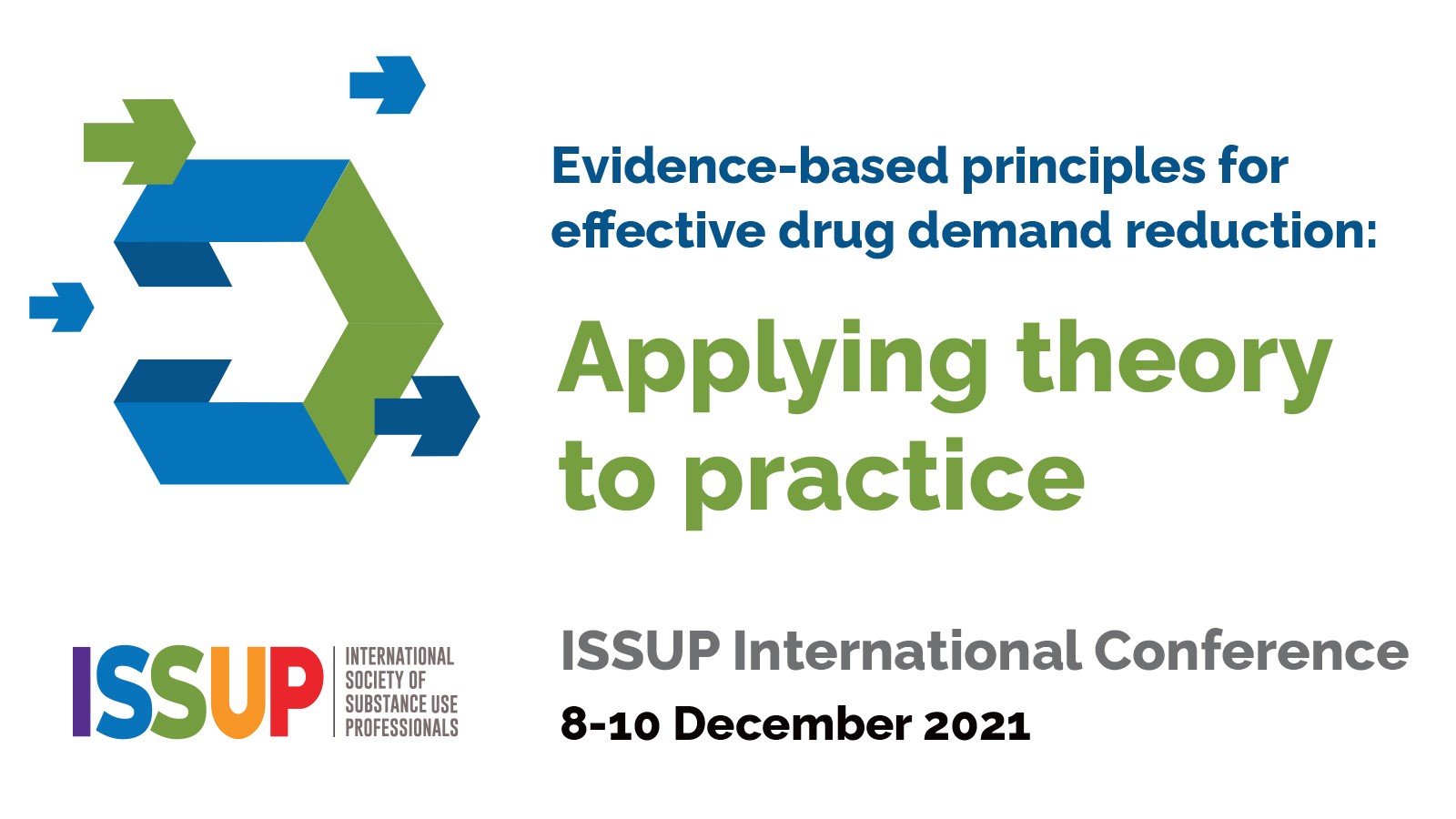The ISSUP International Conference 2021 took place on 8th, 9th & 10th December.
The three-day event focused on deepening the understanding of what is meant by “evidence-based” and considered how the research on what constitutes an evidence-based approach can be transferred to the domain of practical application.
Effective prevention, treatment and recovery support interventions informed by strong research evidence consistently result in positive gains for individuals. Interventions should be supported by high quality research evidence and undertaken within a national and/or international framework of ethical and effective principles to guide all aspects of the work.
This principle is key to promoting effective action and practice of drug demand reduction. However, the transfer of theory into practice and applying research into practical action is an ongoing challenge.
Conference presentations took a case study approach, sharing practical examples of how research has been translated and applied to situations within particular ISSUP National Chapter countries.
An introductory session on the first day addressed what the term "evidence-based” means and its importance for the field of drug demand reduction.
The conference was held virtually as a live event due to ongoing pandemic restrictions, and participants joined and took part in Q&A sessions online.
Reading List
View the reading list on Defining and Implementing Evidence-Based Practice which contains a selection of resources and content that was highlighted by our international speakers across the three days of the ISSUP International Conference 2021.
Session 1: 8 Dec 2pm-3.30pm (London)
Setting the scene: A rationale for the conference
Session Chair: Shamil Wanigaratne, Ph.D. - Consultant Clinical Psychologist and Senior Advisor to H.E. Dr Hamad Al Ghafri, Director General, National Rehabilitation Centre (NRC), Abu Dhabi; ISSUP UAE
- Conference introduction and formal welcome. Joanna Travis Roberts - ISSUP Chief Executive, and Brian Morales - Branch Chief Counternarcotics, Office of Global Programs and Policies (GPP), INL
- Background to the conference theme. Jeff Lee - Manager, ISSUP Scientific Support Team
- Quality Standards, Evidence‐base, and Ethics: Fundamentals for Drug Demand Reduction. Professor Harry Sumnall - Public Health Institute, Liverpool John Moores University, United Kingdom
Session 2: 9 Dec 1pm-2.30pm (London)
Treatment: Evidence-based principles - theory and provision
Session Chair: Martin Agwogie, Ph.D. - Founder/Executive Director Global Initiative on Substance Abuse (GISA); ISSUP Nigeria
- What is effective in drug disorder treatment: what we can learn from the evidence‐base about what
“works” and what “doesn’t work”. Annette Dale-Perera – Director, ADP Consultancy UK, International consultant, UNODC and Colombo Plan and visiting academic Middlesex University, London - From Principles to Practice: A case study of treatment provision in Mexico. Ramiro Valez - Director, CIJ Chihuahua; ISSUP Mexico
- From Principles to Practice: A case study of treatment provision in India. Bilal Ahmad - Programme Director, SPYM; ISSUP India
- Addressing the Challenges: Joint Q&A with presenters
Session 3: 9 Dec 3.30pm-5pm (London)
Prevention: Evidence-based principles - theory and practice
Session Chair: Carlos Ibáñez, MD - Head of Addictions Unit, University Psychiatric Clinic, University of Chile; ISSUP Chile
- Evidence‐based principles for working in Prevention: a consideration of the theory and science behind the principles. Giovanna Campello – Chief, Prevention, Treatment & Rehabilitation Section, UNODC
- Applying the Principles to Practice in Peru: The UPC case study. Fernando Salazar, Ph.D. - Principal Professor, Cayetano Heredia Peruvian University, Lima, Peru; ISSUP Peru
- A prevention case study from Lebanon: Practice Challenges. Anthony Abi Zeid - Programs Associate, Mentor Arabia; ISSUP Lebanon
- Round-table Question & Answer Session: Issues and challenges in translating the theory into practice and examination of practice-based evidence
Session 4: 10 Dec 2pm-3.30pm (London)
Recovery: Evidence-based principles - theory and application
Session Chair: Kristiana Siste, MD, Ph.D. - Head of Psychiatry Department, University of Indonesia; ISSUP Indonesia
- Evidence-based principles for working in Recovery support: a consideration of the theory and science. Hendrée E. Jones, Ph.D. - Executive & Division Director, UNC Horizons, Professor, Department of Obstetrics and Gynecology, School of Medicine, University of North Carolina at Chapel Hill
- A Case Study for Recovery Support in 3 countries. Olha Myshakivska, MD - Psychiatrist, Lviv Regional Psychiatric Hospital; ISSUP National Coordinator, Asia Region
- Case Study for Recovery Support in Kenya: Beatrice Kathungu, Ph.D. - Former Chairperson, Department of Psychology, Kenyatta University; ISSUP Kenya
- Case Study for Recovery Support in Kenya: Pamela Kaithuru, Ph.D. - Head of Counseling Unit, Kenya Meteorological Department; ISSUP Kenya
- Summary and Review: Challenges and Recommendations. Issues and challenges in translating the theory into practice and examination of practice-based evidence
- Thanks and final comments.

